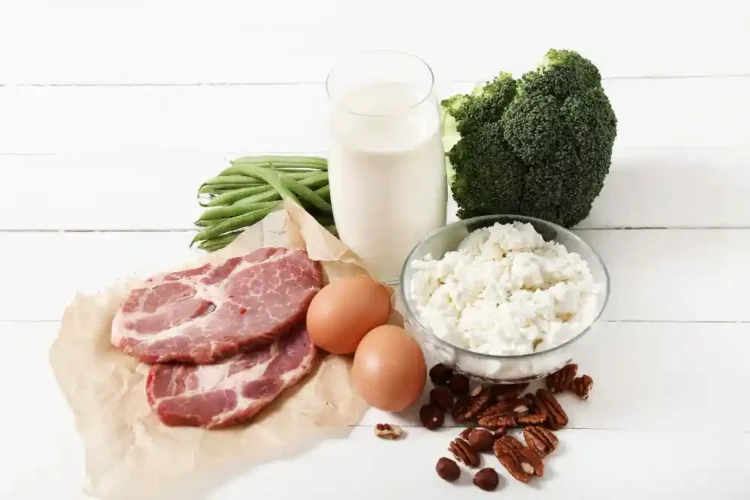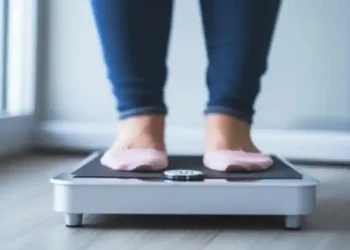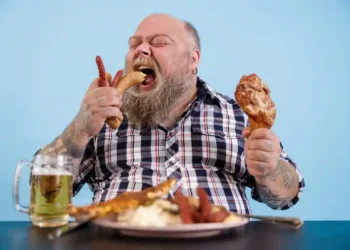Did you know that eating more protein can help you lose weight and grow your muscles? It’s true! Protein is key for reaching your fitness targets while keeping your body healthy. If you want to drop some pounds or get stronger by adding lean muscle, more protein in your meals is a smart move.
Key Takeaways:
- Increasing protein intake can aid in weight loss. It does this by managing hormones, which lowers your appetite and speeds up your metabolism.
- Protein is necessary for building and maintaining muscle. Having enough protein can save your muscle and help make you stronger.
- It’s crucial to include protein in a balanced diet for good weight management.
- Protein helps to control when you feel hungry or full. This lowers your desire for snacks and makes it easier to watch what you eat.
- Eating foods high in protein at meals and for snacks can ramp up how many calories you burn. It also betters how you look, the ratio of your body’s fat to muscle.
The Role of Protein in Weight Loss
Protein is essential for reaching weight loss goals. It helps manage hunger and fullness by influencing appetite hormones. This effect aids in burning more calories and losing weight. Protein also lowers cravings, making it easier to follow a healthy eating plan.
Protein impacts weight loss through its effect on hormones. It boosts the release of hormones like PYY and GLP-1 that make you feel full and decrease hunger. This can lower your calorie intake, which helps with weight loss over time.
Protein’s role in metabolism is critical. It causes your body to use more energy when digesting and processing food. Protein requires more energy to digest compared to carbs and fats. This process raises your metabolism, aiding in weight loss by creating a calorie deficit.
Protein also helps curb appetite and cravings. Eating more protein can leave you feeling satisfied longer, reducing the urge to snack on unhealthy foods. This way, protein can help limit your calorie intake.
To make the most of protein’s benefits, focus on protein-rich foods. Good sources include lean meats, fish, eggs, and nuts. Adding these to your diet boosts weight loss and improves your overall health.
In the next section, we’ll look at how protein influences muscle growth. We’ll see why it’s vital for getting stronger and improving your physique.
Protein for Muscle Growth
Protein is key for gaining muscle and strength. It is the main material for building muscle tissues. It gives the amino acids needed for muscles to repair and grow.
Eating enough protein is vital for muscle growth. It helps get the most from your exercise. With the right amount of protein, you can keep and grow your muscle mass.
Eating protein also boosts muscle strength. Studies show that more protein can make your muscles stronger. This is better than not getting enough protein.
Combine resistance training with protein. This duo is great for growing muscles. When you exercise, your muscle fibers get small tears. Protein fixes and builds these up, making you stronger in the process.
Protein Sources for Muscle Growth
Getting enough protein is crucial for strong muscles. Here are some great sources:
- Lean meats, such as chicken, turkey, and lean cuts of beef
- Fish, such as salmon, tuna, and cod
- Dairy products like Greek yogurt, cottage cheese, and milk
- Eggs, which are a complete source of protein
- Plant-based protein sources like legumes, tofu, and tempeh
People need different amounts of protein for muscle growth. It depends on things like your age and fitness goals. Talking to a dietitian or doctor can help you figure out the right amount for you.
Protein is crucial for building muscles and getting stronger. Combine protein with exercise for the best results. This way, you can achieve your muscle-building and health goals.
Conclusion
Eating more protein is important for losing weight and gaining muscle. Protein does more than just give us nutrients. It helps our hormones, boosts our metabolism, makes us feel full, and keeps our muscles strong.
A diet rich in protein helps us stay full longer. This makes it easier to eat fewer calories. Also, protein uses up more energy when our body digests it. This can help burn more calories even when we’re resting.
For getting stronger muscles, protein is crucial. Muscles are made of protein, so we need it to repair and grow them. Pairing protein with weightlifting boosts muscle power and growth over time.
Protein is key for staying fit and reaching our goals. It’s a must-have for weight control. So, adding protein to our meals is important for anyone working out and watching their weight.











